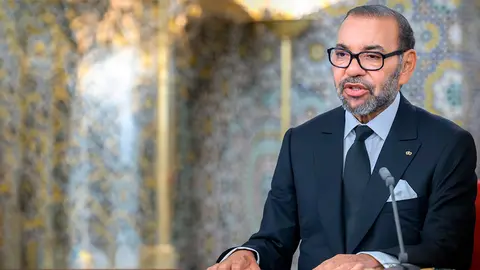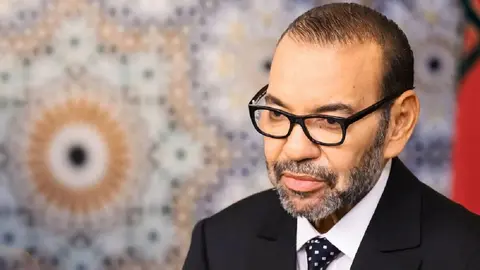Mohammed VI's Morocco: assessment of a sustained transformation

- Economic transformation
- Recognition of territorial disparities
- Constructive diplomacy: international progress on the autonomy proposal
- Morocco as a strategic partner of Spain and Europe
- Final reflections
Economic transformation
After twenty-six years of reign, Morocco's economic transformation is one of the most tangible achievements of this period. The figures speak for themselves: an unparalleled boost to domestic industry, with significant growth in foreign sales over the last decade, has positioned the country as a major player in strategic sectors such as automotive, aeronautics and renewable energy. This diversification of production has not been the result of chance, but of coherent political decisions that have taken advantage of the country's institutional stability. The ability to maintain annual growth rates of 3-4% in a context of recurring climatic adversity and global economic turbulence demonstrates the soundness of its macroeconomic foundations.
Recognition of territorial disparities
The frankness with which territorial inequalities have been addressed in the speech deserves recognition. The “real speech” has optimistically highlighted progress in national cohesion while identifying areas where efforts need to be redoubled. The assertion that ‘progress must reach every corner of the country equally’ underlines the ambition for a more balanced and harmonious Morocco. Data from the 2024 census, which show a reduction in multidimensional poverty from 11.9% to 6.8%, demonstrate the positive impact of social policies and the expansion of basic services.
In this regard, a comprehensive strategy is taking shape to strengthen employment in all regions, ensure universal access to education and healthcare, promote sustainable water use and coordinate major infrastructure projects in line with local specificities. This proactive approach, based on the complementarity of the territories, reflects a firm conviction: true development is measured not only in macroeconomic figures, but in real improvements in the daily lives of every citizen, wherever they live.
Constructive diplomacy: international progress on the autonomy proposal
In the field of foreign affairs, the reiteration of ‘offering a space for sincere dialogue with Algiers’ and ‘strengthening the fraternal ties that unite us’ maintains a consistent position that honours the Kingdom. The definition of the Algerian people as ‘brother people’ and the proposal for responsible dialogue reflect a diplomatic maturity that prioritises the higher interests of the region over temporary differences.
Similarly, the growing international recognition of the autonomy initiative for the Sahara represents one of the most notable diplomatic successes of the recent period. The explicit support of countries such as the United Kingdom, Portugal, France and Spain, coupled with President Trump's recent reaffirmation of US backing, consolidates a trend that reinforces the legitimacy of Morocco's position. This growing consensus demonstrates that the autonomy proposal is a pragmatic and fully defensible option in international forums, offering a realistic framework for the resolution of the conflict. The vision expressed by the King of a ‘consensual solution in which there are no winners or losers’ embodies the values of reconciliation and coexistence that must underpin any lasting settlement.
Morocco as a strategic partner of Spain and Europe
In this context of international consolidation, it is essential to highlight the fundamental importance of bilateral relations between Morocco and Spain, as well as the projection of this alliance towards Europe as a whole. Contrary to the constant media and social media tension that certain sectors eagerly seek to project through hate speech and distorted narratives, reality shows that Morocco is an indispensable ally for Spain in many strategic dimensions.
Spanish-Moroccan cooperation transcends purely commercial aspects to encompass critical areas such as migration management, the fight against terrorism and Atlantic-Mediterranean security. This collaboration has made it possible to address common challenges with an effectiveness that underlines the need to strengthen mutual trust between the two countries. Morocco's geographical position as a natural bridge between Europe and Africa makes it a key partner in addressing global challenges such as climate change, orderly migration and sustainable development.
The economic data speaks for itself: Morocco has established itself as the main destination for Spanish exports in Africa and represents a constantly expanding market for Spanish companies, especially in sectors such as energy, infrastructure and technology. The presence of more than 1,000 Spanish companies operating in Morocco is tangible proof of the stability of the business climate and the mutual trust that exists between the two countries.
Energy interconnection and joint projects in renewable energies are concrete examples of how bilateral cooperation contributes not only to mutual development but also to European energy security. At a time when Europe is seeking to diversify its energy supply sources, the alliance with Morocco takes on an additional strategic dimension.
Morocco's political stability and growing influence on the African continent position it as a natural partner for Spain in the European effort to redefine strategic autonomy. This partnership is particularly valuable in an international context marked by uncertainty and geopolitical tensions.
Final reflections
The 2025 Throne Day speech presents an honest assessment of the achievements made and the challenges ahead. The trajectory of these 26 years demonstrates political management characterised by strategic continuity, pragmatic adaptation to global changes and the ability to maintain national cohesion in a complex international environment.
Advances in economic development, international projection and recognition of the Sahrawi proposal for autonomy are important assets for the future. The challenges of territorial equity, water sustainability and democratic consolidation require innovative responses that build on accumulated strengths.
Spanish-Moroccan cooperation today represents a model of Euro-Mediterranean partnership that demonstrates how mutual respect, shared interests and economic openness generate not only prosperity but also trust and stability. Instead of fuelling confrontation and misperceptions based on alarmism, rumours and manipulation of data that promote division on this side of the Strait, the way forward must be through dialogue, cooperation and recognition of Morocco's indispensable role as an ally of Spain and Europe in an increasingly complex world.
The leadership exercised over the past decades has demonstrated its capacity for adaptation and renewal. The coming years will determine whether this trajectory will be the definitive consolidation of an inclusive development model and an international profile that will make Morocco a key player in its natural geopolitical space, maintaining and strengthening the strategic alliances that have contributed to its success.



